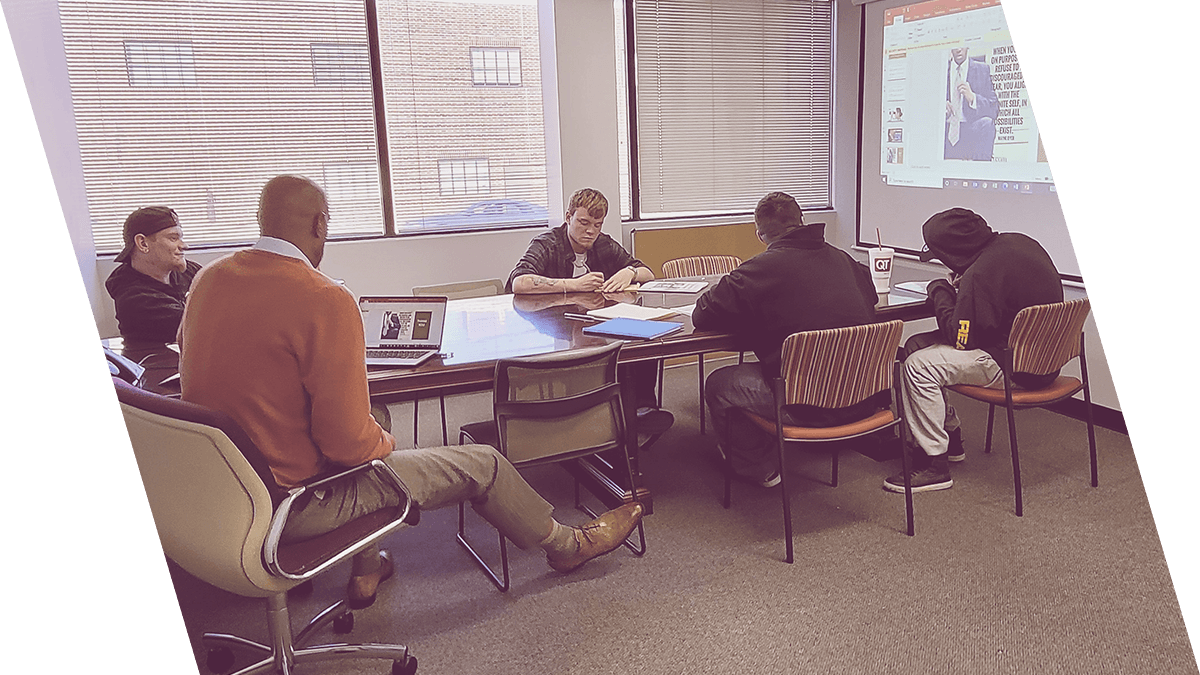The Program
Helping young men take the 1st Step to better lives.
Oklahoma is a nationwide leader in imprisoning young men, many of them for nonviolent offenses. Imprisoning young men for nonviolent offenses is expensive. The 1st Step program saved Oklahoma taxpayers $3.3 million from 2017–2020 and delivered a 92% success rate, relieving our overcrowded prisons, reducing recidivism, and changing lives for the better.
Helping young men stay out of prison and take their 1st Steps to better, more productive lives is our mission—here is the proven, evidence-based program that makes it possible.

Four Phases. One Goal. Improving Lives.
1st Step is a four-phase program. Young men advance through the program after meeting certain milestones under supervision of our staff.
In addition to the basic core programs above, young men must attend classes in life skills, parenting, financial literacy, and (if needed) couple’s counseling and anger management.
Every Step in 1st Step.
Under the direct supervision of our professional staff, young men enrolled in 1st Step follow a proven, evidence-based model for rehabilitating nonviolent offenders. This process is focused on developing better decision-making skills, identifying triggers, avoiding relapse, and becoming stable, productive members of society.
Sober-Living Housing
Young men live communally in supervised, sober-living houses either owned by 1st Step or leased with established, sober-living organizations. Sober living provides young men security, discipline, and distance from negative relationships that can harm their progress. Young men must strictly follow house rules, with supervision by the District Court responsible for ensuring public safety.
Treatment
Providing young men with proven, evidence-based counseling is critical to the program. Young men receive counseling in individual and group settings with skilled professionals who help them develop better decision-making skills. While working at their jobs and living communally in a sober-living house, young men also learn to solve problems and lead successful, crime-free lives. Where appropriate, young men also attend NA or AA classes in a regular 12-step program.
Job Placement
Getting a job and starting a career are critical for young men to develop responsible, law-abiding lifestyles. Throughout the program, providers and consultants provide assessment, counseling, training, and job placement, helping each young man create his own career path — achieving financial independence, self confidence, and community acceptance.
Mentoring
Young men who may have grown up without positive role models learn to cope with life’s challenges under the guidance of experienced and empathetic mentors. Many of our mentors speak from experience, and are men who have turned their lives around to become law-abiding citizens. 1st Step partners with Stand In The Gap to recruit, train, place and monitor at least one mentor per participant.
Education
Education is one of the highest priorities for the program. Young men must earn their high school diploma or obtain a G.E.D. if they haven’t already. Additionally, young men receive advanced education through a partnership with Tulsa Community College and Tulsa Tech. Education instills skills and builds confidence, while removing barriers which contribute to unhealthy relationships and lifestyles.
Success
Young men don’t simply complete the program—they earn it. 1st Step is a rigorous, but compassionate program that helps keep young men out of prison, now and in the future. Graduates must be in compliance with all court orders, and be able to live with personal responsibility, social skills, educational and career achievements, and a commitment to community and good citizenship.

Work Readiness Program.
1st Step’s in-house Work Readiness Program focuses on preparing 1st Step participants in skills and perspectives needed for employment.
The program objectives are to help participants:
- Develop self-esteem and self-confidence in their worth and their employability.
- Understand expectations of employers.
- Develop skills that will improve employment opportunities and generate a positive impression.
- Overcome toxic barriers which prevent young men from gaining and keeping employment. Toxic barriers include negative stereotypes of masculinity such as not expressing emotion, disrespecting authority, and disrespecting women.
Work Readiness participants complete an assessment to identify employment related interests and skills. They address topics such as mechanisms for finding employment, best ways to write a resume and cover letter, how to dress for employment — including a visit to a shop to select interview and court-appearance appropriate attire, embracing change, 21st century workplace skills, emotional intelligence, effective responses to email and text messages, and insights into verbal and non-verbal communication.
Homework assignments are based on the curriculum and the book Employment Success by John Liptak. The course is presented in 8 sessions over 4 weeks by Suited for Life Consultant Maurice Nelson.




